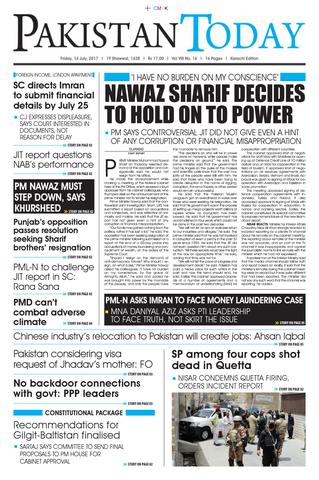News Analysis |
In response to the ousting of former Prime Minister (PM) Nawaz Sharif and the Foreign Minister Khawaja Asif, the Election Commission of Pakistan (ECP) has removed the legal requirement to declare Iqama (work permit) in the nomination papers for 2018 general elections.
The Electoral Reforms Committee (ERC) has deleted 19 declarations on oath from the nomination papers in the Elections Act 2017, which were mandatory for a contestant in the past. The elimination of these highly significant requirements will effectively mean that there would be no one stopping tax evaders, loan defaulters, and dual nationals to contest general elections and become part of the Parliament.
After the Nawaz-Khawaja debacle, to make things easy for the forthcoming parliamentarians, the incumbent government has facilitated the candidates. According to reports, many politicians still hold Iqama, though few have canceled in wake of the Khawaja fiasco. However, some politicians still continue to hold work permits. Under the new law, Iqama holders will not have to go under scrutiny or possible legal action by any court.
When the Apex Court intervenes, political parties raise the questions pertaining to its constitutional power to intervene in executives work, undermining the supremacy of the Parliament.
The ECP is consulting the officials of the other institutions including the National Accountability Bureau (NAB), the Federal Investigation Agency (FIA), the State Bank of Pakistan (SBP), Sui Gas, and WAPDA to devise the strategy regarding thorough screening of the nomination papers. In regard to this, given the changes introduced, they might not have to do much.
Read more: PML-N is Urban-centric: Check your facts Mr. Chief Minister
Shambolic reforms under ‘Election Act of 2017’
The ‘Election Act of 2017’ appears to be a step backwards to the dark ages. Under the ‘Election Act of 2017’, any individual charged with a criminal offense can aspire to become a parliamentarian. If elected as a leader, he/she can effectively control the parliamentary conduct of elected members of the Parliament, despite being deemed unfit to be even a member of the Parliament.
Recently, the Indian Supreme Court banned politicians with criminal records from contesting the elections, for life. Additionally, Pakistan Supreme Court also made a landmark decision to disqualify Nawaz and Khawaja, for being dishonest.
Despite nullifying a clause of the Election Act 2017, [which allowed a disqualified parliamentarian to be apart head] and ousting Nawaz for the second time as a party head for life. Under Election 2017, any alleged criminal can still influence decision making inside the Parliament.Consequently, unless a person is not a proven guilty, he/she cannot be stopped from contesting elections, despite being charged and indicted.
Now, they even don’t have to explain the difference between the net assets of current financial year and the previous year.
The apex court should take the responsibility to check if any particular act of the Parliament is not in the synchrony spirit of constitution and rule of law. When the Apex Court intervenes, political parties raise the questions pertaining to its constitutional power to intervene in executives work, undermining the supremacy of the Parliament.
Read more: ECP to conduct online scrutiny of candidates in upcoming elections, what…
With this in mind, Institutional confrontation is criticized but, the separation of power between the institutions is yet to be cleared.Under the Pervaiz Musharaf regime, candidates were required to declare, under oath, the payments of their loans, taxes and utility bills. This practice was followed in 2002, 2008 and 2013.
After ousting of Nawaz Sharif, under new legislation, it is not mandatory for election candidates to declare the outstanding loans from any bank, financial institution, or corporate body in the candidate’s name or in the name of his/her spouses, or any dependent.
Moreover, candidates no longer have to declare the list containing names of their spouse(s) and dependents, the default in payment of government dues or utility charges, present occupation, national tax number, education, income tax paid during the last three years, or the companies owned by the candidate or his/her spouse and dependents.
The elimination of these highly significant requirements will effectively mean that there would be no one stopping tax evaders, loan defaulters, and dual nationals to contest general elections and become part of the Parliament.
Under the previous laws, candidates had to take oath that, “I hereby solemnly declare, to the best of my knowledge and belief, that (i) no loan for an amount of Rs2 million or more has been obtained from any bank, financial institution, cooperative society or corporate body in my own name or in the name of my spouse, any of my dependents or any business concern mainly owned by me. Nor do the aforesaid stands unpaid for more than one year from the due date or has been written off.” This has undermined the power of the ECP with regards to their sources of income.
Read more: New challenge for Nawaz Sharif: Senate amends Election Act 2017
Furthermore, potential candidates will no longer require to; declare details of their travel abroad during the last three years, important contribution made by the candidate for the benefit of candidate’s constituency [if elected previously], and the sum paid to any political party that awarded the ticket to the candidate.
Significantly, candidates no longer have to make a declaration to abide by the code of conduct issued by the ECP. Under the previous law, incomes and assets of elected representatives were readily available which could facilitate swift accountability. Now, they even don’t have to explain the difference between the net assets of current financial year and the previous year.
These steps of the powerful political mafia curbed the public disclosure of tax status and loan defaults, reducing the power of the ECP to scrutinize the candidates. Under such circumstances – where the Parliament is advocating controversial legislation – the new laws threaten the democracy and is a major peril to the justice system in the country.














